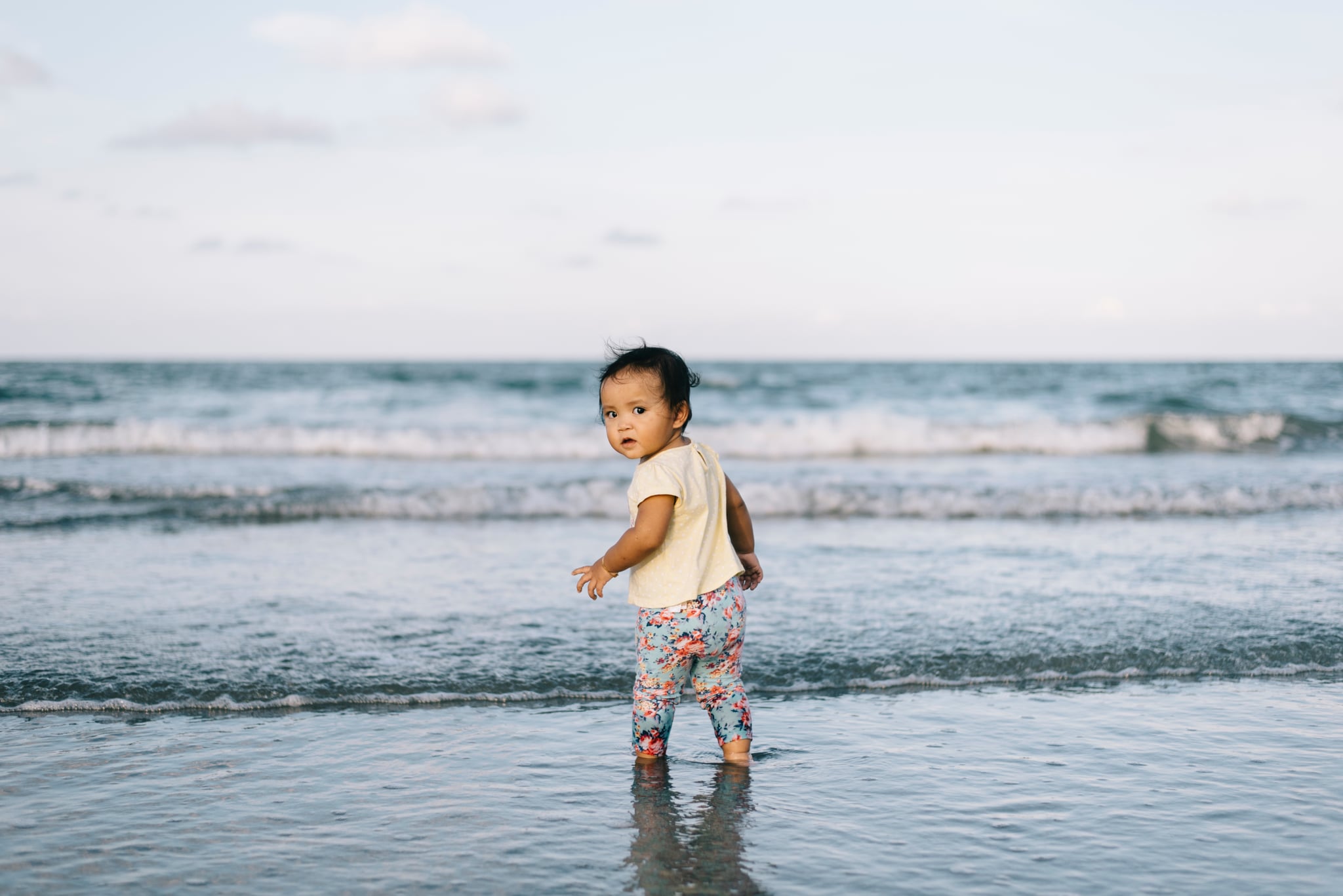How to Help a Toddler Who's Afraid of the Ocean
My Toddler's First Beach Experience Was Not Great — Here's How We Got Past It

My husband and I were so excited to take our daughter to the beach for the first time. We had driven past the ocean before, but she had yet to put her tiny feet into the water. Our first attempt at getting to the beach didn't end well — we couldn't find parking and our little one was so disappointed. The next weekend, we were determined to spend some time on the actual beach and allow her to experience the magic of the ocean. When we arrived she grabbed my husband's hand and bolted for the water. The first tiny wave splashed her shins and she looked up at us so excited. The next small wave splashed up to her tummy . . . and she totally lost it. Her happiness instantly turned to fear and my husband and I felt awful. As an LMFT, I knew I could help my daughter deal with her fear of the ocean, though. Here's how.
How Can I Help My Child Process Their Fear of the Ocean?
As parents it's our job to help our little ones feel safe, while fostering their ability to process their emotions in a healthy way, rather than brushing off their experience or simply telling them that they're okay. Helping children process their emotions can lead to higher levels of emotional intelligence, which not only impacts children in their current state, but goes on to impact their choices as adults. As a former practicing therapist with a specialty in trauma, I could feel the weight of this experience on our little one.
To help her feel grounded, we offered her both physical and emotional support by picking her up immediately after the splash, walking away from what scared her (the ocean), and telling her she was safe and we weren't going to get wet again unless she wanted to. We held her tight and continued reassuring her until her body began to relax. Keep in mind that it's important to honour your child's unique comfort level, especially after something scares them, instead of pushing them back into their discomfort without allowing them some time to process their experience first.
How Should I Discuss the Scary Situation with My Child?
When discussing a scary situation with little ones, it's important to give them control over their story, validate them using their words, help them feel safe and connected, and praise their ability to identify their feelings. This is how we did it: After a few minutes of holding her, I asked her if she was comfortable sitting down in the sand. I reassured her that the water was really far away and would not be near us. She felt comfortable, so we plopped down. I pointed to the ocean and asked her what happened in the water and she said it was "scary," "loud.," and "too much." I validated her experience and said that the ocean was loud and that the splash that happened was scary and too much for her today. I added that dad picked her up right away and we walked away from the water. I then noted that we were so proud of her for being brave and trying something new. She wanted to go over what happened several more times, and I know how important this is for little one's to process information. We continued to use her words (scary, loud, too much) to help validate her experience and also kept repeating how much we love her and how brave she was. We asked her if she wanted to stay and play a bit in the sand and she said she wanted to leave, so we left. I told her we could visit big blue (as she calls it) another time if she wanted to.
How Do I Reintroduce the Ocean to My Child?
If your child is reluctant to head back to the ocean, reintroduce ocean related material at a pace that your child can tolerate. While this will depend on each unique child, use your best judgement, read their cues, and always ask how they are feeling, even if they are just glancing at an image of the ocean. In our case, we've been looking at pictures of the ocean and watching videos of sea critters. We talk about the ocean being loud, but beautiful and tell her when she's ready we can try again. We've driven past the ocean a few times and asked her if she wanted to go and say hi to big blue. While she hasn't gone back into the ocean, she has felt comfortable enough to go to the beach once more and play in the sand. We made it a huge deal and praised her bravery big time. We definitely want her to feel good about trying things again, and to know that at any point we can leave if she feels uncomfortable. When she does want to go back in to the ocean, we will be sure to remind her that her feet are going to get wet, and that the water is going to be cold so she won't be surprised this time around.
How Should I Praise the Small Steps My Child Makes to Getting Over Their Fear?
Parental praise is an important factor in parenting that directly impacts how a little one's brain develops. Even more so, it changes the structure of the brain in that those who receive parental praise tend to have more grey matter volume in the left posterior insular cortex which is associated with empathy and openness to new experiences. Take small steps with your little one in getting them to feel more comfortable with the ocean and offer them praise when they look at any ocean related material, or opt to try the beach again. While gentle encouragement is okay, pushing your toddler too far when they feel scared can lead to internalizing feeling unsafe and a lack of control, and that's definitely not what we want. Know that with time, and your help processing the triggering situation, your little one will likely warm to the idea of giving the ocean another chance. If you notice that your child is incredibly terrified of something ocean related, you can also reach out to a child psychologist for a little extra assistance.







